Humans
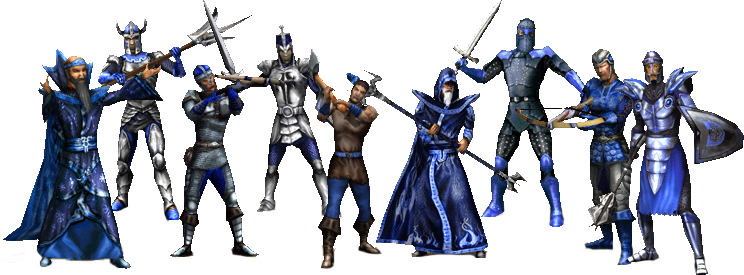
There may well have never been a human empire, nor the legends of the Dragon Slayers, if many millennia ago, a few dwarves had not set out from their home in Grimwarg to seek adventure in the distant peaks of the Windwall mountains. They had hoped to find good stone, valuable metals, and a new home, but found only barren rock and a few tribes of wild barbarians living in inhospitable caves in the frozen heights. And though these creatures appeared to the dwarves as weak and primitive – their lifespan was barely longer than that of most animals – they immediately recognised the willpower and lifeforce that had been instilled in these creatures. Impressed by the barbarians, the dwarves stayed and began to teach them of the world, the Gods, and the art of forging.
Never would those dwarves have thought that their actions might change the world forever. Greedily, the humans devoured their knowledge, learning each move and all the wisdom of their teachers, and this wisdom spread like wildfire. Soon, the first smith’s hammers began to ring in the Windwalls and formed the first of the great swords that were to become the human’s trademark. With these weapons, they descended from the mountains and took control of the plains, their numbers ever increasing. The Age of Swords had begun.
Although the mighty dragons were the undisputed rulers of the Fiara, even their formidable might could not stop the humans’ advance. With lances and swords, they confronted the ancient lizards and accomplished the impossible, a feat that neither dwarf nor elf had managed: They drove back the dragons. With courage and creativity, they defeated one mighty dragon after another and filled the once-empty plains with villages and cities.
With their victory over the ancient rulers of Fiara began the rise of the humans, a race that was both good and evil, courageous and cowardly, strong and yet weak, the strangest and most varied of all races of this world. And with their rise came cities, trade, money, and war.
| Worker |

|
Humans are a race of cities, trading, and craftsmen. Thus, there is always more than enough work to be done and an ever-increasing number of settlements to be expanded and fortified. It is not at all unusual for a young man to leave his parents and work his way across the country, taking on odd jobs to pay his way, trying his luck here and there until finally deciding upon a craft to learn. To his life’s end, he will then work maybe as a fisherman, farmer, or carpenter.
|

| Armsmen |

|
Armsmen are the backbone of the human armies. They are recruited in times of war from the lower levels of society and instructed in the use of the halberd. With these simple, but effective weapons, they repel orcish lancers or try to hold back storming trolls. To this end, the human blacksmiths supply them with heavy armor that offers good protection against most weapons and ensures their survival on the battlefield. Armsmen are usually simple folk, but with their hearts of oak and under the command of the right leaders, they have decided many a battle for the human armies. Over their years in service, many of them have become decent fighters and these few devote their time to the training of recruits, further increasing the skill of Armsmen and gaining them more and more respect.
|

| Scout |
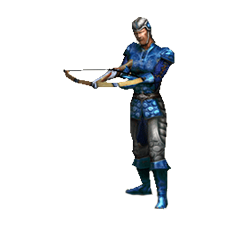
|
Since their first wars against the orcs and – in darker times – against the elves, humans know that not every foe will face their armoured units on the battlefield. Often their warriors were ambushed and slain without a chance to retaliate, or their enemy would retreat and flee out of reach even before their units had arrived. Since those days, scouts have been an integral part of human armies. They carry only light armour and are more manoeuvrable and much quieter than their comrades. They take up position on the flanks of a battle, warn of surprise attacks and advance secretly into enemy territory, where they gather reconnaissance about their foes. Scouts are usually recruited from simple hunters and trackers that wish to serve their country in times of war.
|

| Cleric |

|
Magic has always been dangerous to humans. Their thirst for power and conquest is stronger than that of any other race, and they cannot resist the allure of magic. Thus it is not surprising that the Mage Wars and the evil-doings of the Circle were mainly due to the influence of human Mages. After centuries of guilt that humans brought upon themselves through these acts, magic is not a desirable thing. Faith, however, is a major driving force for humans. Their short lifespan drives them to bind deeply with religion, with many of them devoting their lives to Aonir, the god of stars, or Tiara the sun dancer. Healing and consolation are their duties, but should war threaten the land, many of them will don their armour and take arms, joining their comrades in battle. With healing hands and righteous rage, they are a symbol of the presence of the gods, hope, and the indomitable human spirit.
|

| Enchanter |
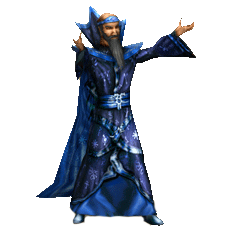
|
Since it is disliked and mistrusted by the common people, magic is hard to learn in human territories and its use is often frowned upon. The leaders of the human realms, however, know of its power and would not be so foolish as to ignore its potential in battle. And so they encourage and foster its learning in secret, favouring the magic that, like white magic, best suits a human’s natural abilities: Mind Magic. A skilled mage can use this magic to manipulate their foes, cause them harm, or even cripple them. The art of fast hypnosis or enchantment has been honed to perfection in some schools. A well-trained Enchanter can stop his enemies in their tracks and completely paralyse them. With this advantage, even huge armies of orcs that would otherwise have crushed the human forces can be easily defeated. Their ability to render large numbers of enemies unable to fight in a short period of time has secured the Enchanter's position behind the human battlelines.
|

| Recruit |

|
The long years of war against the dark races took their toll on the human armies. Their reserves were depleted, many regions fell to the dark ones and battle for battle, the human ranks were decimated. It was at this time that groups of volunteers began to form in the occupied territories and resist their oppressors, groups that became known as Daikin. They were hardly more than farmers or craftsmen, and nary among them could afford to buy weapons or armour. Inventive and deft as they were, however, they were able to craft simple weapons and the leather armour that would become their trademark. And were they not able to drive out their dark oppressors, they were at least able to flee and join the remaining armies in the free lands. There, they proved a worthy addition to the cumbersome ranks of the armsmen. Since this time, any volunteers wishing to join the army serve among these troops of the light, who to this day bear the traditional leather armour of the Daikin. A recruit’s duties include securing fortresses and strongholds or patrolling the borders of the realms. On the battlefield, they reinforce the flanks of the army and attack enemy archers or mages that the armsmen cannot reach quickly enough.
|

| Paladin |
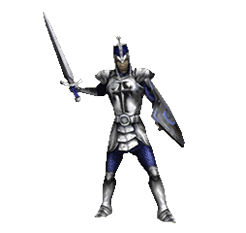
|
They are the noblest warriors of the human realm, protectors of the people and faith. In Aonir's or Tiara’s name, and under the command of their king, they are always ready to protect the innocent and defenseless with their lives. Fearing neither weapon nor magic, their courage and faith are unshakable. Before the Convocation wars, Paladins were organised in great orders - the greatest of which, the Iron Falcons, covered the whole of the Northern Realm. Now the few surviving Paladins serve the new realms where they can, always on the lookout for brothers from the disbanded order. Paladins are masters of combat with sword and shield, and through their faith and devotion are bestowed the power and will to use the pure, white magic of the gods. They are a noble ally for those that win their trust and a relentless foe for those that incur their wrath.
|

| Mentalist |

|
From the halls of the secret schools come not only scholars and masters of enchantment. There are also a select few who devote their lives to the dangerous path of offensive mind magic. They can enter their victim’s thoughts, break their spirits and destroy them with the sheer power of their magic. This power is feared since neither armor nor shield can offer protection. Any warrior that locks eyes with a mentalist knows that his end is near, and fear strikes deep into the hearts of those that witness a comrade falling dead as if struck down by a ghost. A mentalist’s training is long, and many fail to meet the harsh requirements. Only those whose spirit is clear and cold as ice can attain this level of mind magic, and for the rest, there is only madness.
|

| Marksman |

|
On the battlefield, the crossbow is surpassed by the lightning-quick elven bows, but in the hand of a marksman, it is nonetheless a deadly weapon. Rising from the ranks of the scouts, they shoot not only faster than their comrades but with uncanny accuracy. Marksmen are rare, and their training costly, thus most warlords ensure they are equipped with chain armor, thereby ensuring them the best possible protection and the longest possible use of their skill. Usually, marksmen take position behind the ranks or on the walls of strongholds, whence they can rain a deadly hail of bolts onto their foes.
|

| Star Mage |
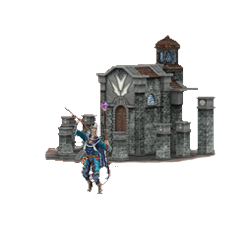
|
It is not just the magic of healing and strengthening that is taught at the large star-monasteries of Aonir. There are also secret schools of the magic of starlight which can only be mastered by the high priests. They collect the light of their far-off god through the stars at night and combine it to form destructive lightning used against their enemies’ fortresses. The star magicians are proof that light can also bring destruction once its anger has been awakened.
|

| Bloodhound |
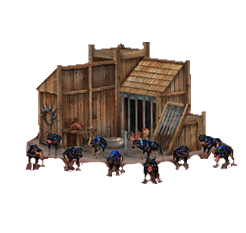
|
These dogs hunted the scouts of the orcs along Nortander's borders, they picked up the scent of assassins of the Norcaine dark elves in the east of the Highmark and they often were the last line of defense, with their teeth barred, between their wounded master and an overpowering enemy. On their own, there is little a bloodhound can do, but in a pack, they can be the downfall of any armored warrior. And even when the world drowns in darkness and all hope disappears, these creatures will never leave their master's side.
|

| Griffon Rider |
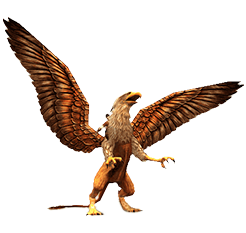
|
Long before the Age of Swords had dawned, before the dwarves had taught humanity how to forge iron, Fiara had been the land of the dragons. But with the rise of the humans, the dragonslayers had also risen and humans descended from the Windwall Mountains to purge the land of lizards. They became the new masters of Fiara. But their fight would have been short-lived, had they merely sallied forth on land against the giant wyrms. During their long years among the cold peaks of the Windwall Mountains they had forged bonds of friendship with others sharing their exile: The Griffons. These noble creatures had almost been driven to extinction during those times, hunted down by dragons or starving in the eternal snow. The humans shared their food with them and thus won their eternal friendship. When the Age of Swords finally came, the humans fielded not only iron-clad regiments, descending the slopes of the Windwall Mountains, but they also flew out, mounted on the backs of griffons, armed with the cold steel lances of the dragonslayers, which brought fear to the hearts of dragons. Thus, it was that men and griffon alongside each other battled for their place on the plains and in the legends of Fiara. The Griffon Rider fights with the fierceness and daring of the Dragonslayers. His mind is wild and free, thus mind magic is of little use against him. His strength in attacking and his mobility are his main assets on the field of battle. Those fighting side by side with him are often inspired by his bravery and share the fighting spirit of the riders and, like him, rage like a hurricane amongst the enemy lines. He is the very symbol of the free spirit and combat prowess of the race of humans. But this child of the wild has little defence against the treachery and dark force of black magic, having almost no power to resist against it.
|
 The Realm
The Realm

For the first time after the end of the rune wars, which had lead to the final elimination of the Circle, an order started to develop in the old empires.
Whereas in Nortander the five dynasties still contend for influence, the southern human empire of the Highmark has a new king. Despite the harsh conditions after the Convocation, the empire blossoms, but at the same time has to defend its wealth against the Iron Storm Clans and the Dark Elves from Lar. But even with its proud castles and well-armed knights, the Highmark has to remember the old realm of the Light People, if it wants to stand against these enemies.
| Craftsman |
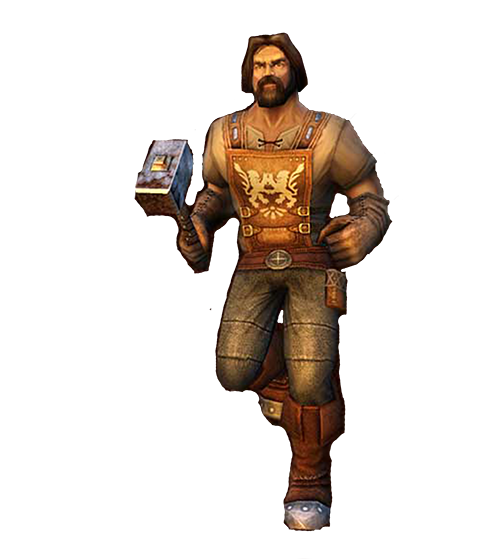
|
Hard-working, they are taking care of the construction of the buildings and are simultaneously looking after the provisioning of raw materials. In the case of an attack, they prove their loyalty and help in defending the bases.
|

| Soldier |

|
They are the backbone of the realm, the basic troops, which constitute the core of any army. They are wearing strong armour from the fine forges of the realm. Not only their iron armour but also their heavy shield provides great protection, and their flashing blades are an example of the special sword forging skills of the humans. Apart from their duties in battle, the soldiers are, in times of peace, also guards in the cities and at the borders of the realm.
|

| Crossbowman |
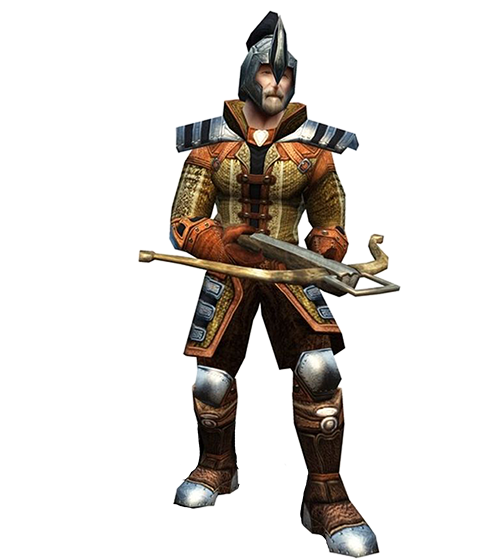
|
They combine the skills of scouts and marksmen. Their armour gives them the free movement of a ranger, but also provides the necessary protection to survive duel in battle. Even though the crossbows of the humans are not as accurate and long-range as the bows of the elves, they are still a deadly threat to more lightly armoured units.
|

| Mounted Crossbowman |

|
The first attempts after the convocation to reintroduce the cavalry into the army lead to the emergence of these mounted scouts and runners. However, one soon recognized that these cavaliers were capable of much more. Equipped with the advantages of wild equestrian people, these long-distance fighters are hard to get for the enemy and their outstanding speed quickly brings them to the important scenes of events and just as quickly away from them.
|

| Paladin |

|
The knights of the Orders of Dawn, the Iron Falcon, or of Tiaras have always been steady companions of the Army of Light. In the realm they combine the mobility of mounted crossbowmen with heavy armour and an unexcelled sword arm. Their faith does not only give them power, but also the ability to effect divine magic against the Undead, which makes them particularly effective against these enemies.
|

| Magician |
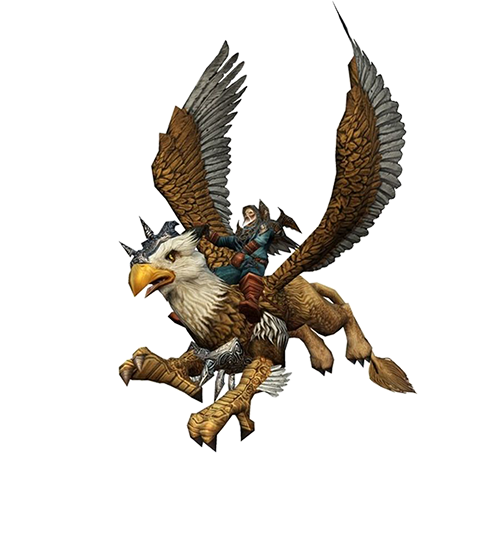
|
The Order of Dawn had for a long time been looking for a way to protect the Light People from the flying creatures of the dark. Under the leadership of Master Matricus, the Order finally managed to utilize gryphon taming for more than just a few chosen ones. Thus the mages of the order learned the gryphon flight. They sweep over the battlefield like the wind, unreachable for swords and axes, while they weave their feared mental spells above the heads of the enemies, in order to break the spirit of their adversaries.
|

| The Lightbringer |
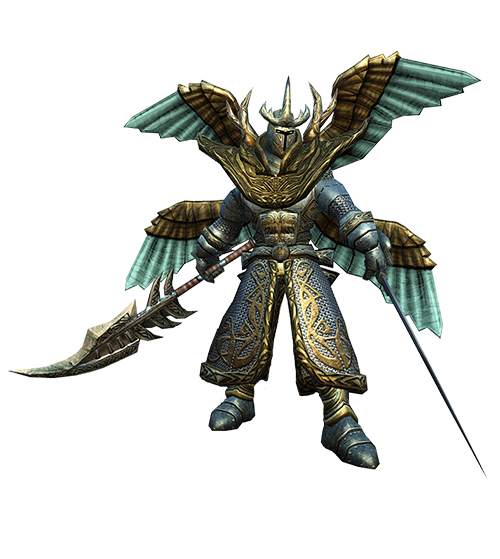
|
Once in every generation Tiara, the sun goddess, chooses a paladin who fought under her banner and got killed in self-abandonment. Him she raises to the heavens, bathed in holy light, so he can rest at her table and enjoy the glittering dance of the golden goddess. But if the distress of the believers in Tiara ever became unbearable and their calls should reach high up to the heavens, those heroes would rise from her table and descend on Eo to fight back the waves of darkness with Tiara’s light. Like towers they will rise high above the battlefield, their blades will sweep the servants of darkness aside and their holy flashes will cut trenches through the lines of the enemies. That is how they proclaim the wrath of their goddess: with iron and light.
|
 The Clans
The Clans
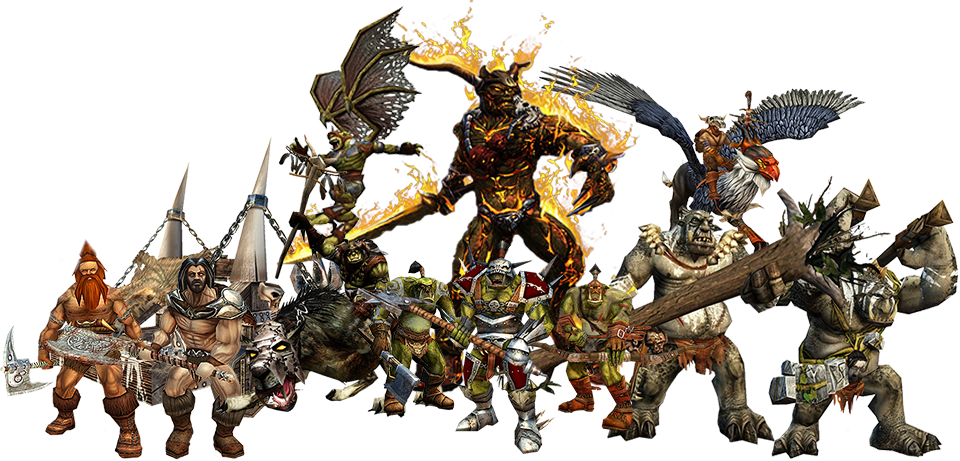
After the dark ones had been defeated in the War of the Six Races, their armies dissipated and the survivors founded their settlements all across Fiara. With the dark elves founding their new empire of Lar and the Sharok orcs occupying the north of the great glacier, the southern orcs and trolls had less luck. Their existence had become that of small marauding war troops roaming the country which always had been wary of the armies of light.
When the Iron Lord came he reunited the wild orc clans under his rule with his words and the slashes of his axe. He led them from the Blackwater Coast through the grasslands of the green lake until the Gate of Swords. Among the former bulwarks of the elves, he and his companions found shelter.
There they met with the barbarians of the middle mountains who were driven out of their former home and who were roaming the country without any lead or direction. The Iron Lord brought to them the belief in Zarach and included them under his banner.
| Axeman |

|
The axe is the life of a Barbarian of the West. It is the bride of a true warrior and his steady companion. The father forges the blade, the mother’s hair is wrapped around the handle and the names of the forefathers ornament the blade. This weapon is the only thing that accompanies the son to his name consecration into the pit of wild dogs. Only a boy that instinctively knows how to use his weapon will be allowed to go with the Iron Storm. The others will be left in the mud as sacrifices to the Blood God.
|

| Spiritist |
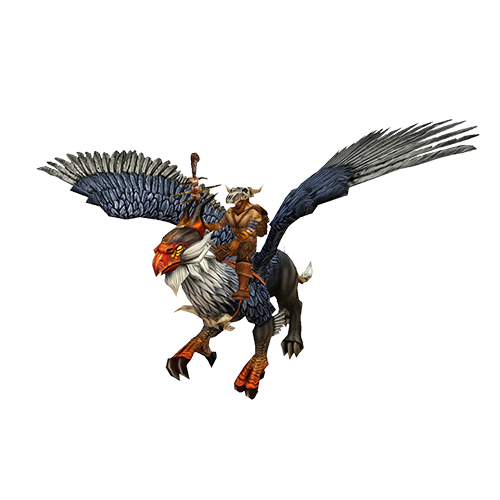
|
He is a battlemage that flies on a griffon over the battlefield and destroys the enemies of the Clans in the air and on the ground in a storm of the elements. The Barbarians of the West might be thought of as primitive, but the force of their wild magic can easily compare with high Elemental magic. It was also the nature-loving Spiritists of the Westmen Barbarians that once forged the bond between the Humans and the griffons. Still to this day the griffons are their confidants and their companions.
|

| Berserker |
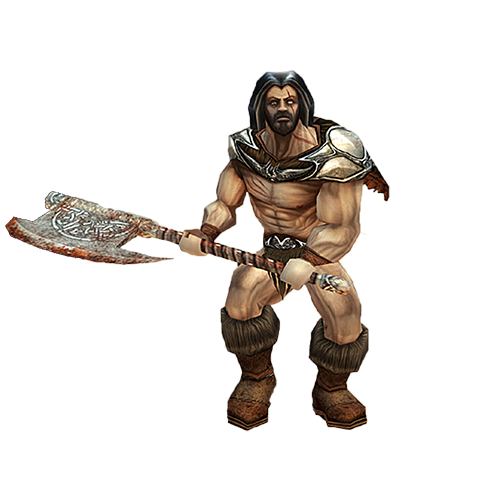
|
He is the mightiest close combat fighter of the Clans, his two hand axe tears disastrous gaps into the hordes of opponents. The Berserks dedicate their bodies to the Blood God Zarach and their absolute dedication lets them forget about pain and danger. If a Barbarian warrior chooses the path of a Berserk, his relatives start singing a requiem. If he survives the cruel Berserk consecration, his only true homelands will be the battlegrounds, for the sake of the Blood God.
|

























